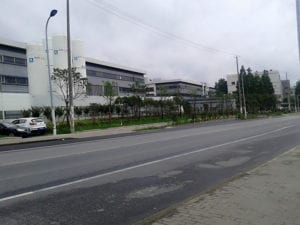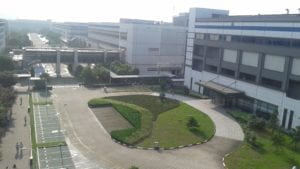Dejian (Ken) Zeng
China Labor Watch
Shanghai, China
“The grievance is building up. Let’s go to Shanghai!” Li Qiang, Executive Director of China Labor Watch, told me this before I left New York, when I had been anticipating going to Shenzhen. The grievance is that of the workers in a factory owned by the Taiwanese Pegatron Group, one of Apple’s suppliers. The workers’ basic salary increased slightly to align with the minimum wage set by the government, but they experienced a big loss in income with the elimination of their meal stipends.
We were waiting for a strike.
Thus, the plan for my summer project changed dramatically. In addition to switching my location from Shenzhen to Shanghai, I also changed my research methodology. Instead of just conducting interviews with workers, I decided to go undercover and become a true worker myself in order to collect first-hand information. With only a backpack, a few shorts and T-shirts, pens and a notebook, and an old-fashion phone, I flew to Shanghai alone. With anxiety and passion, I walked into the unknown.
The factory is located in a suburban section of Pudong New Area. This quiet neighborhood still includes a rural village, which is vastly different from the brand-new Shanghai Disneyland just 5 kilometers away. It took me 20 minutes to walk from the subway station to the factory, where dozens of people seeking work were waiting before the factory door with their luggage. Some of them looked happy but some seemed a bit worried. Security guards yelled angrily since some of them were blocking the entrance. It was a busy day.
Researchers from CLW had visited the factory in advance to ensure that it was hiring workers. Generally, people just need to appear at the front door of the factory with their ID cards, and a very simple interview would be conducted there. If nothing were to go wrong with the physical examination and the rest of the procedures, they would sign a contract and become an official worker. The factory would take care of their meals and accommodation starting from that day.
Most of the people seeking work there are migrant workers with a rural hukou (household registration) status. Worried that my urban hukou status would raise suspicion, I contacted one of the workers who was referring people to the factory for assistance, but surprisingly, the staff did not care about my hukou status at all. The interview took only 30 seconds. I was asked to show my hands and recite the alphabet. Before I could even figure out what had happened, I was being allowed inside the factory.
A new journey started there, of ethnographic research that includes observations, interviews with workers, and documenting my personal experiences to get a better understanding of the Chinese worker and the operation of the labor movement through a human rights framework. During the past two months, I have worked on the assembly line, lived with the other workers in dorms, and have been excited to share the feeling of being a Chinese worker. I keep a diary every day, and my observations will be published at the end of the project.



